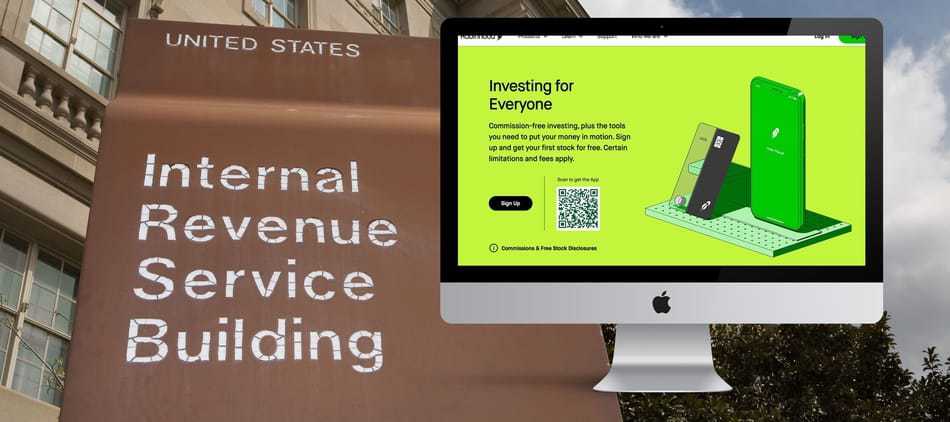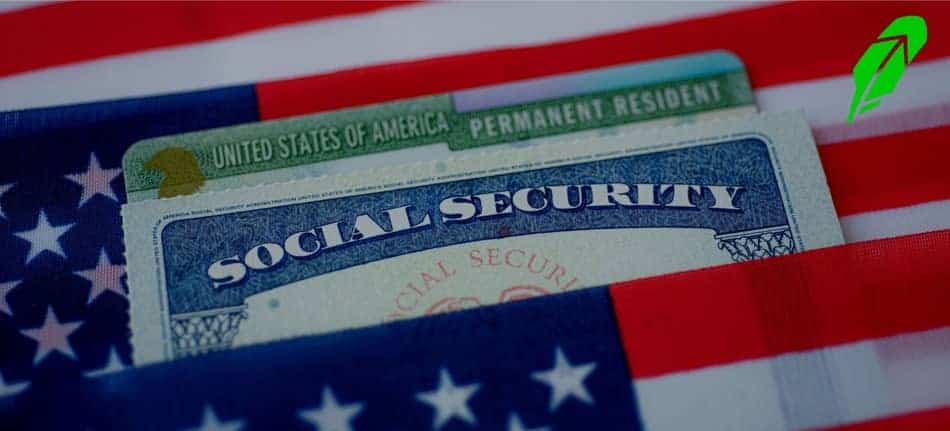
Tax season is always a stressful time for investors no matter what country you live in.
In the US, sites like Robinhood can make it a little easier for you with automated annual 1099 forms. But does Robinhood itself actually report your trading activity to the IRS?
Robinhood is required by law to report your investment income to the IRS. This means that if you sell stocks for a profit, the IRS will be aware of it and expect you to declare the proceeds on your taxes.
Let’s take a further look into why the IRS needs to have your trading information from Robinhood and other trading platforms.
| Starting to Invest? | Our Recommendation | Start Trading Today |
|---|---|---|
 | Robinhood InvestOnly in USA
| Start Trading Today |
Does Robinhood Report to the IRS?
Robinhood is required by law to report any tax documents rendered from user’s trading activity.
As many negative headlines as Robinhood has made over the past couple of years, it is still regulated by agencies like the SEC and FINRA. On top of that, Robinhood is now a publicly traded company on the NASDAQ exchange so it needs to follow industry regulations.
Robinhood will report any capital gains or dividends you make within the tax year. As long as you make over $10.00 in annual dividends, you need to report this figure to the IRS. Of course, any capital gains, whether short-term or long-term, must also be reported to the IRS as a part of your annual income tax.
One interesting stipulation that affects Robinhood users is reporting your free stocks to the IRS. For new users, Robinhood usually gifts the user a free stock to start them on their investing journey. If, however, this free stock or free stocks are valued at more than $600 by the time you report your taxes, you actually have to report this to the IRS as income.
“Thanks for signing up, here are more taxes!”
What Happens if you don’t Report Robinhood Trading on your Taxes?

We’re not here to give financial advice, but you might want to consider reporting your capital gains and dividends to the IRS. If you don’t – you are playing with fire.
Remember, Robinhood provides your activity to the IRS so they already have a history of the stocks you have bought and sold.
Americans who do not report their trading capital gains to the IRS will immediately set off some alarms. It probably depends on how much your gains were, but if it is a significant amount, you can expect the IRS to come knocking.
If you still don’t feel like reporting to the IRS, you can be subject to fines, penalties, or worse depending on your tax history.
As a Canadian, all of my investment income is shared from my online brokerage account to the CRA, which I actually love. Because for one, I don’t plan on trying to avoid paying taxes, and two, it makes filing my taxes so much easier as all my documents are in my CRA online account.
How do I Avoid Capital Gains Taxes with the IRS?
There are plenty of investing vehicles you can use to avoid capital gains taxes. Unfortunately, if you want to continue to trade with Robinhood you won’t be able to take advantage of these tax-free investment accounts. The only way to avoid capital gains taxes when you trade with Robinhood, is to not sell your stocks or hold non-dividend-earning stocks.
Recommend Reading: Non-Dividend Paying Stocks | Why Do People Invest in Them?
If you want to trade on another trading platform, you’ll want to look for sites that offer the ability to trade within retirement accounts like the Roth IRA or a 401K account. Any capital gains and dividends in these accounts are non-taxable up to a certain limit. Take advantage of these accounts first, even if they are not offered on Robinhood!
| Starting to Invest? | Our Recommendation | Start Trading Today |
|---|---|---|
 | Robinhood InvestOnly in USA
| Start Trading Today |
Does Robinhood Report Crypto Earnings to the IRS?
Yes, Robinhood is required by law to report your crypto transactions to the IRS. Therefore, if you buy or sell crypto on the platform, the IRS will know about it and expect you to report any gains or losses on your taxes.
Just because cryptocurrencies are ‘decentralized’ and held in a digital wallet, it doesn’t mean they aren’t taxed by the IRS. As is the case in most countries, the IRS considers cryptocurrencies like the popular Bitcoin to be your personal property in the form of a capital asset. This means that the agency taxes capital gains in the same way that they tax stocks.
Since you can trade cryptocurrencies on Robinhood, the platform will automatically produce a 1099 form for your crypto gains as well. And there’s no avoiding this one, so even if you buy cryptocurrencies through Robinhood, you might want to take the advice of the crypto community and HODL those assets.
If you don’t sell, you don’t incur capital gains!
Does Robinhood Report Stock Losses to the IRS?
It should be noted that anytime you carry out a transaction that results in a capital gain or capital loss on Robinhood, the app will prepare a 1099 form. Once it does this, the IRS automatically receives a copy of this and files it against your social security number.
Recommend Reading: Why Does Robinhood Need My SSN? (Here Are the Facts)

While capital losses aren’t ideal, the IRS does allow you to write off up to $3,000 in losses towards your income tax. This means that if you sold any stocks or cryptocurrencies at a loss during the year, you can deduct $3,000 worth to lower your tax bill.
Let’s face it, nobody likes losing money on a trade or investment, but at least the IRS lets you use some of it as a tax deduction.
Hopefully you don’t have to use this write off ever, but if you do, take advantage of it and move on!
Do I Have to Report Capital Gains or Losses on Options Trading?
Yes, unfortunately you do. Even if you never exercise options contracts and only buy and sell for the premium, you still need to report this as either a capital gain or loss. You might never actually handle the shares of the stock but the IRS considers the premium to be a traded security.
If you exercise the options contract and take possession of the shares then you only need to pay capital gains taxes if you sell those shares. Again, since this is a transaction, Robinhood will track this and send this information to the IRS automatically.
Conclusion: Does Robinhood Report to the IRS
Since Robinhood is a regulated trading platform, it has no choice but to report your trading activity to the IRS. While there are some exceptions, you will generally need to pay capital gains taxes to the IRS on any profits you made from trading or on any dividends you earned.
This applies to any securities including stocks, ETFs, and even cryptocurrencies
Geek, out.
| Starting to Invest? | Our Recommendation | Start Trading Today |
|---|---|---|
 | Robinhood InvestOnly in USA
| Start Trading Today |






